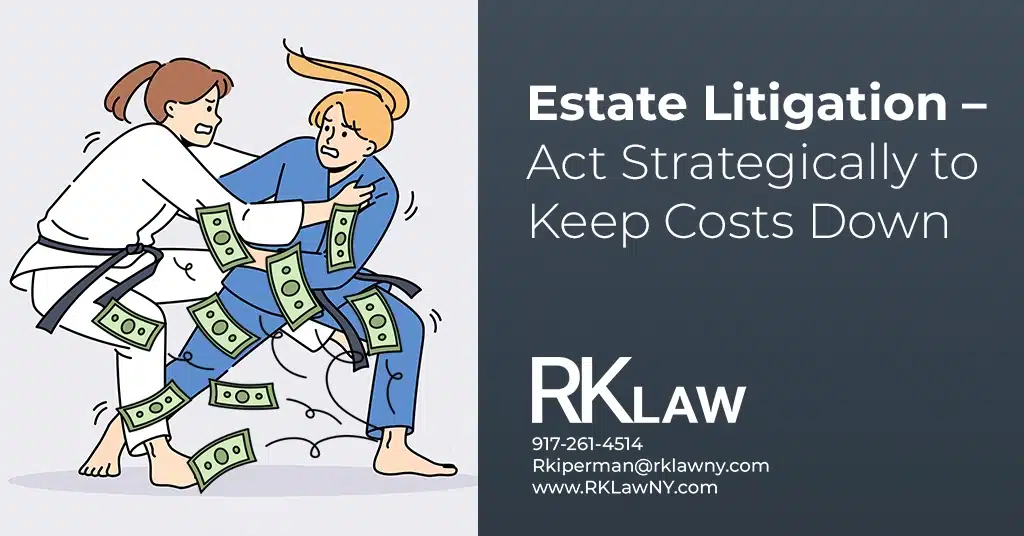This month, I wanted to share with you the complex realm of estate litigation – a process that arises when disputes and conflicts emerge in the administration of an estate.
- Yes, it can often be a very emotionally taxing time. You are often at odds with your own family.
- Yes, it can be drawn out and challenging. You’re often sifting through documents for many months, building a case against someone you know.
It’s not fun. The best and most practical advice I can offer is to act strategically, practically, and diligently. If you let your emotions get the best of you, be prepared to spend a lot of money.
Common Cases in Estate Litigation:
Will Contests:
A Will Contest is when someone fights or challenges the validity of a Will. Common claims are that the will was not properly executed, was signed when the testator lacked capacity, or was the by-product of undue influence. Will contests typically begin with SCPA 1404 examinations, then move on to Objections being filed, then move to 1411 Citations being issued, and depending on the County, have different discovery rules apply. The key to a successful Will contest is discovery, depositions, and understanding the facts surrounding the execution of the Will.
Executor or Trustee Misconduct:
Conflicts can also arise when someone mismanages an estate. Clear examples of estate mismanagement are self dealing, using your role as fiduciary to sell estate or trust property to yourself, using the estate or trust as a piggy bank for your personal expenses, or failing to act altogether. Removal proceedings are among the many remedies available in cases of fiduciary misconduct. You can also commence a discovery proceeding if you suspect fiduciary misconduct.
Creditor Claims in Estate Litigation:
Disputes may emerge regarding the validity and priority of creditor claims against the estate. Common remedies are to compel an accounting or file a petition to determine the validity of a claim
Stages Of Estate Litigation:
Initiation of Legal Action:
Estate litigation usually begins when a concerned party files a legal complaint outlining the specific issues in question. At that point you (or they) may only have limited examples of evidence, but the overlying dispute is in the air.
Discovery Process in Estate Litigation:
Both parties gather evidence through a process known as discovery, which involves the collection of relevant information and documents. This is when more evidence is brought to the table. Examples could be email threads, text messages, videos, medical records, etc. The information gathered is used to further your claim in the dispute.
Potential Settlements:
Although there is a dispute, a legal battle in court is not always necessary. Disputes are often settled outside of court, as to avoid drawn out court cases.
Trial:
If an agreement cannot be reached, the case proceeds to trial, where each side presents evidence and arguments.
Judgment and Appeals:
The court issues a judgment, and either party may choose to appeal the decision if dissatisfied with the outcome.
Tips for Navigating Estate Litigation:
Open Communication:
Encourage open and transparent communication among family members to address concerns before they escalate into legal disputes.
Documentation and Organization:
Keep thorough records and documentation to support your case or defend against potential claims. Keep records neatly organized and categorized for ease of access and clarity.
Legal Counsel:
Seek the guidance of an experienced estate litigation attorney to navigate the complexities of the legal process. We’re on your side and can help with your estate litigation needs.
For more information, please contact NYC Probate Litigation, Guardianship, NYC Probate and Estate Planning attorney Regina Kiperman:
Phone: 917-261-4514
Fax: 929-556-2089
Email: rkiperman@rklawny.com
Or visit her at:
40 Wall Street
Suite 2508
New York, NY 10005
Visit Regina on LinkedIn
Visit Regina on Facebook
This page is made available by the lawyer for educational purposes only as well as to give you general information and a general understanding of the law, not to provide specific legal advice. By using this site you understand that there is no attorney client relationship between you and the lawyer. The post should not be used as a substitute for competent legal advice from a licensed professional attorney in your state. ATTORNEY ADVERTISING.
